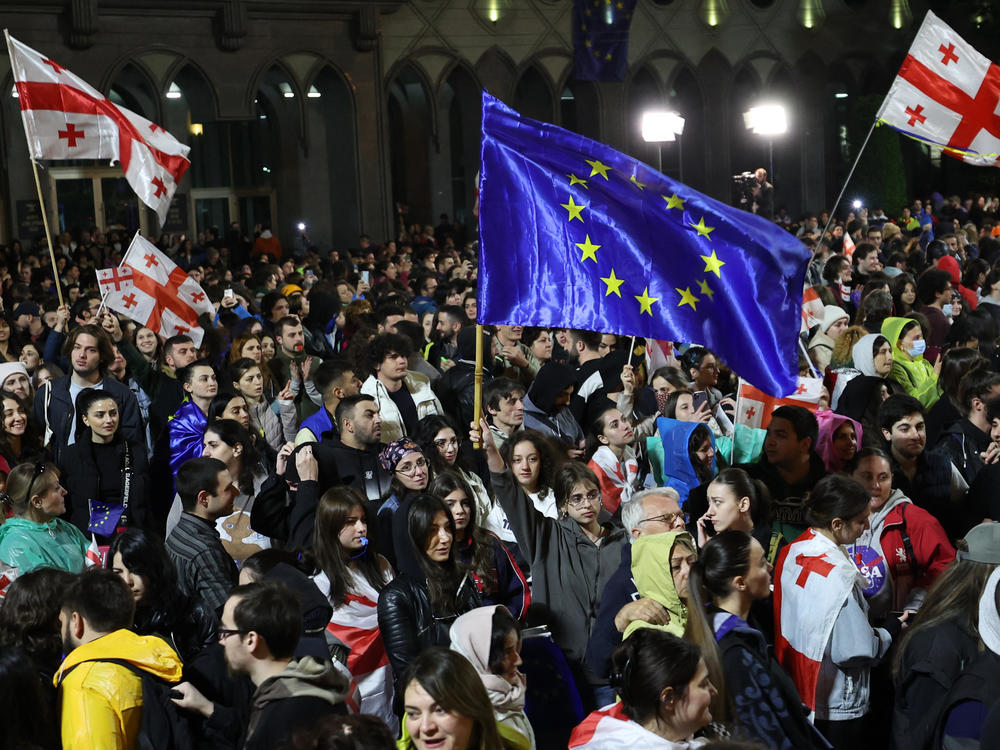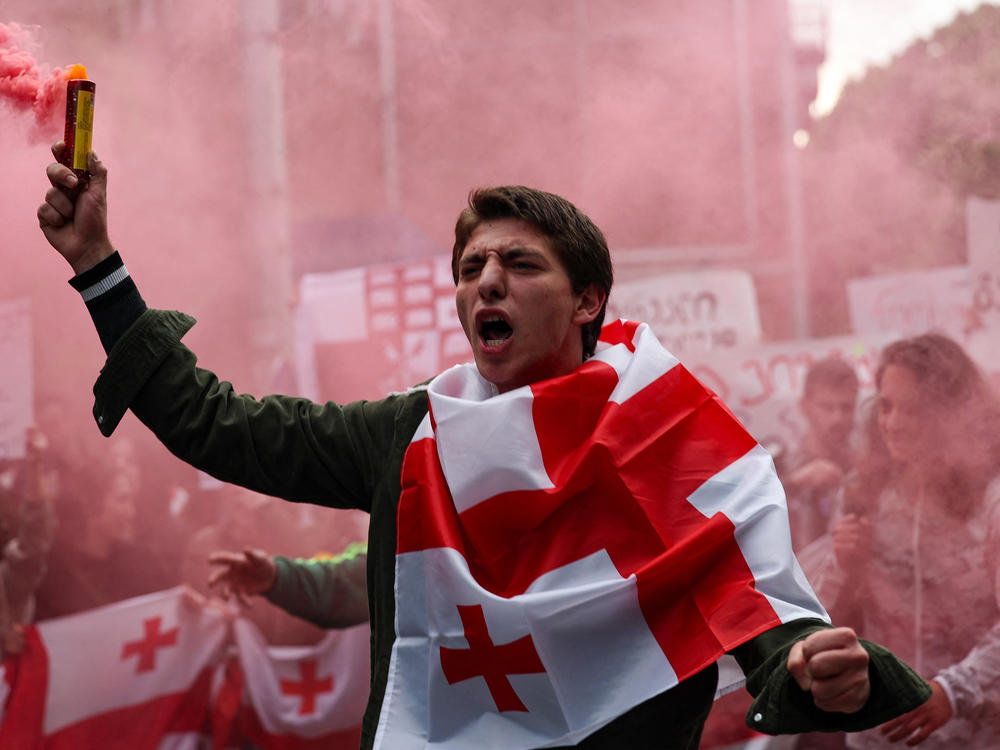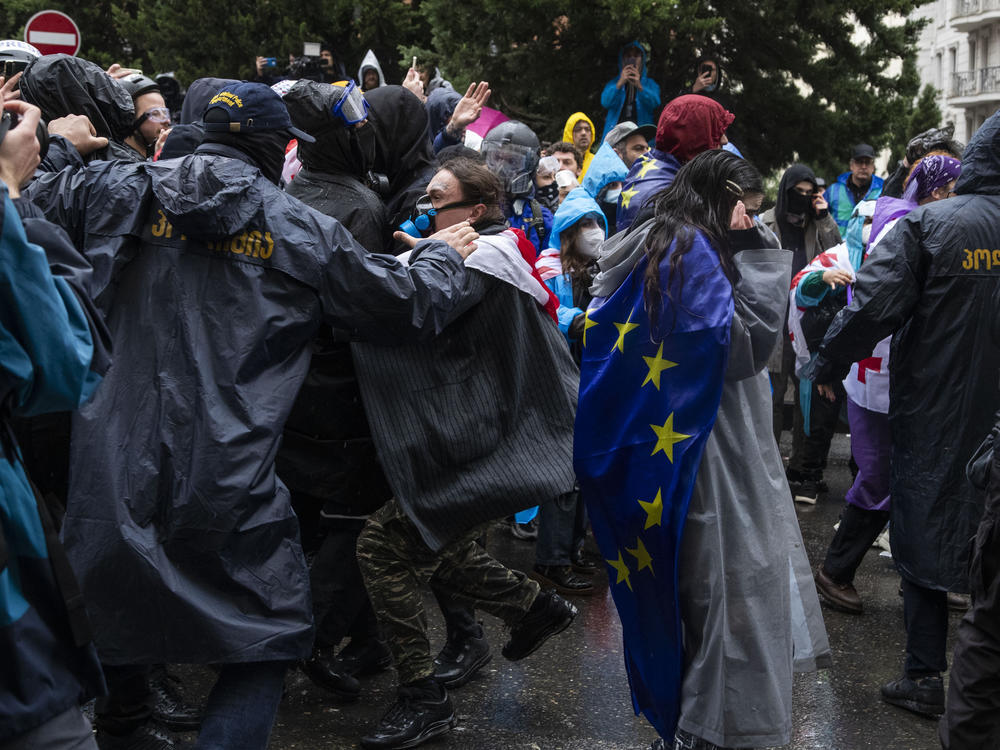Section Branding
Header Content
Why protesters in Georgia are opposed to a 'foreign agents' law and why it matters
Primary Content
Tens of thousands of protesters in the former Soviet republic of Georgia are fighting a controversial law set to be passed by the country's parliament this week.
Many people see the battle over the proposed "foreign agents" bill as a tug of war for influence between Russia and the West.
Supporters say the law is about transparency and preventing outside influence on Georgian politics, while opponents say the bill is modeled on a Russian law that has been used to clamp down on dissent.
Here's what you need to know.
The 'foreign agents' bill, and why it's so controversial
The draft legislation, proposed by the ruling Georgian Dream party, or GD, would require nongovernmental organizations and media companies that get more than 20% of their funding from abroad to register as "pursuing the interests of a foreign power" and provide financial statements about their activities. Those that fail to do so could face hefty fines.
Proponents of the bill say it's necessary to prevent foreign influence and will make information about foreign funding more transparent. They also say the bill is based on a similar U.S. law — the Foreign Agents Registration Act — which dates back to 1938.
But critics, who call the proposal "the Russian law," say that similar legislation passed by Moscow in 2012 has been used to crack down on critics of the Kremlin, from independent media organizations to human rights groups. Many say the Georgian government is using the law to align Georgia closer to Russia and quell dissent ahead of key national elections this fall.
In an interview with NPR earlier this month, GD lawmaker Maka Botchorishvili, who heads the parliament's committee on EU integration, fiercely rejected accusations that her party is aligning itself with Russia.
"As [a] Georgian politician and Georgian citizen, it is very much insulting when somebody puts Georgia and Russia on the same level," Botchorishvili said.
She said Russia remains Georgia's "No. 1 threat" given the Kremlin has occupied parts of Georgian territory since a brief war in 2008.
Last year, widespread protest forced the government to abandon efforts to pass a similar law.
What protesters are saying
The current protests began in mid-April, shortly after Georgia's parliament passed its first reading of the bill. Since then, protesters — including a large swath of people from Generation Z — have been gathering at nightly marches toward the parliament. Many of them say they want to ensure Georgia's future includes entry into the European Union.
While Georgia was given official candidate status for EU membership in 2023, critics say the foreign agents bill is incompatible with European values of democracy and free speech. If the bill is passed, it would likely create a headache for Brussels to move forward with Georgia's EU candidacy.
A December 2023 poll from the National Democratic Institute found that 79% of Georgians support the idea of EU membership.
"I want to be a part of Europe, and I want my freedom, as my other friends do," Mariam Esaiashvili, a university student, told NPR at a protest in Tbilisi earlier this month. "But this law just gets us more far from that mission."
"We are in the crossroads right now," said Giorgi Gzirishvili, a 29-year-old IT specialist who has been protesting since April. "We either have to ensure our future by becoming a member of NATO and [the] European Union, or we'll not exist in 10-15 years."
How the most recent protests have unfolded
While initially attracting younger crowds, the largely peaceful protests have galvanized Georgians of all ages in more recent days.
More than 50,000 gathered over the weekend, with huge crowds seen marching through Europe Square, chanting "Georgia!" Thousands stayed overnight in front of the parliament, where they hoped to block lawmakers who were scheduled to discuss the bill on Monday from entering the building.
Masked security eventually showed up to disperse the crowds in the early morning hours, using water cannon trucks, tear gas and rubber bullets to remove people.
Twenty people were detained, according to Russian state news, including two Americans and one Russian citizen.
Protesters are expected to continue to gather near parliament through the final vote on Tuesday — and perhaps beyond.
What happens next
A final vote on the proposal is scheduled for Tuesday — and the bill is expected to pass.
Georgia's President Salome Zourabichvili — a fierce critic of the bill — has said she would veto it, but the ruling GD party has enough control in parliament to override her.
The two biggest figureheads in Georgia, Prime Minister Irakli Kobakhidze and the Georgian Dream party's billionaire founder Bidzina Ivanishvili are both eager for the bill to pass.
Kornely Kakachia, the director of the Georgian Institute of Politics, told NPR he sees the law as a way for Ivanishvili to exert more control over free media and civil society.
"This is the only one sector [Ivanishvili] does not control," Kakachia said. "These people are not depending [on the] government. They have their own income and they are the ones who criticize and challenge the government."



